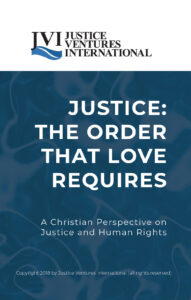Confronted with these realities it is easy to fall into despair. However, there is reason for hope. It is a hope grounded on the power of God and the amazing work of local leaders and organizations, what we call “justice ventures,” working with others around the globe to fight against the evil of slavery. This hope is embodied in the powerful river imagery from the book of Amos. The prophet condemns the nations for taking captive whole communities, selling the innocent and the needy for silver. He exhorts them to “let justice roll on like a river, righteousness like a never-failing stream.” Amos 5:24
What is Justice?
Justice can be defined as the exercise of power and authority to order society according to God’s standards.1 Some theologians have argued that the concept of justice is limited to accountability or retribution and that concepts of restoration and transformation are not really justice at all but rather an expression of love.
But as Stephen Charles Mott points out, “justice is not a different principle, in contradistinction to love; rather it expresses in terms of fixed duty and obligation the appropriate response to love in certain social situations.”2 Loving actions may take place in an evil society, such as a slave society. But if the order of society is not changed then love itself is thwarted. Justice, then, is the order which love requires.3
Scripture makes it clear that God’s justice requires freedom, accountability, restoration, and transformation.
Justice includes the exercise of power and authority to:
I. Free victims of injustice from the abusive/oppressive situation;
II. Hold offenders accountable for their abusive/oppressive behavior;
III. Restore victims of injustice by bringing healing and relief, as well as restore offenders to society (where possible) through restitution and other appropriate rehabilitative measures;
IV. Transform unjust structures and systems into those that more justly distribute the benefits of society (i.e., security, economic opportunity, education, political participation, etc.).4
Because God bestows dignity on each person, each person in society (individually and collectively through the institutions of society) has a duty to treat all persons with dignity and respect and individuals have a corresponding right to such treatment.
What does it mean to seek justice for the poor and oppressed in today’s world?

At JVI, we are seeing a growing River of Justice that is beginning to flow across our world today. This river will ultimately wash away the scourge of slavery by the power of a loving God working with and through people like you and me to free the captives, fight the traffickers, and bring lasting restoration and protection to the vulnerable.
In recent years, JVI’s initiatives have directly impacted over 60,000 lives while strengthening the capacity of over 50 local justice organizations to serve thousands more on an ongoing basis.
JVI and its partners worked with local governments to conduct 44 rescue operations freeing 937 human trafficking victims while intercepting nearly 700 more in transit before they reached an ultimate trafficking destination. Currently, JVI and its partners are serving over 5,000 individuals through its aftercare and legal aid programs. These survivors are experiencing sustained freedom and a better life.
JVI believes that the work of justice is sustainable only if embraced and led by individuals in local communities where injustice occurs. We build the capacity of local nonprofits, businesses and other organizations engaged in the work of justice by coming alongside, joining together as partners and bolstering their effectiveness.
JVI works on the front lines in poor and oppressed communities where the battle for justice rages daily, freeing the oppressed from slavery and other extreme injustice. By partnering with like-minded justice organizations, we combine greater skills, innovation and cultural understanding to design justice solutions that work so that people can live free from oppression and experience abundant life.
